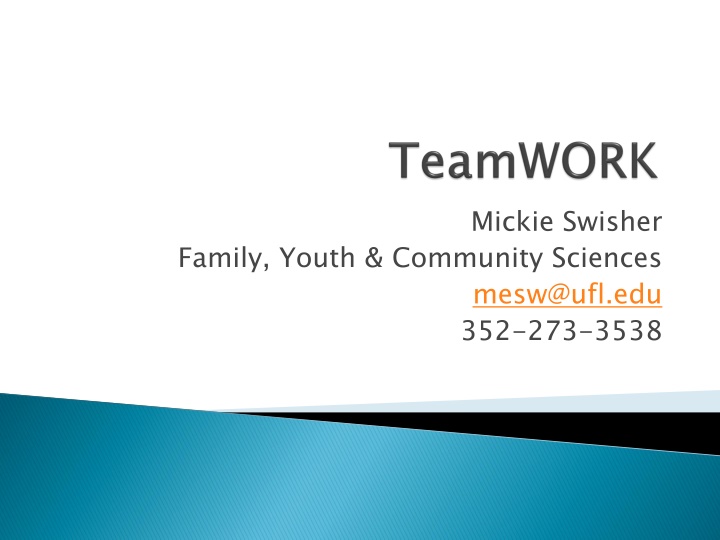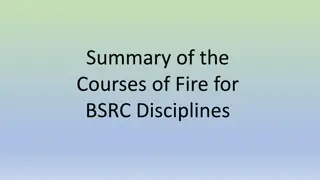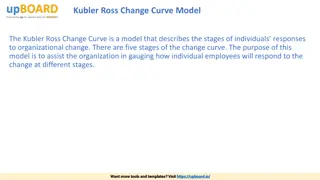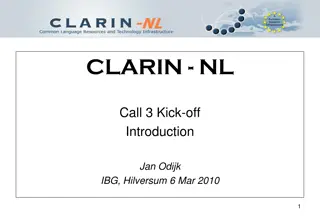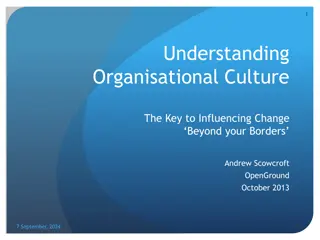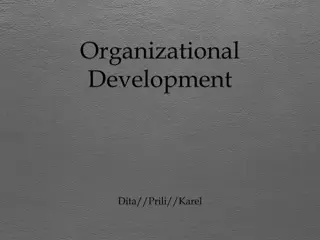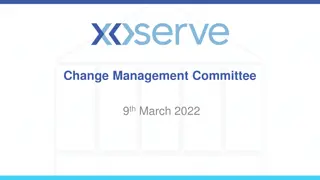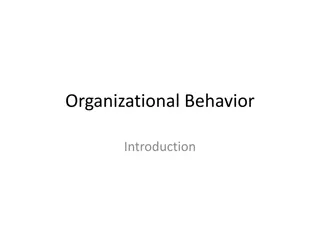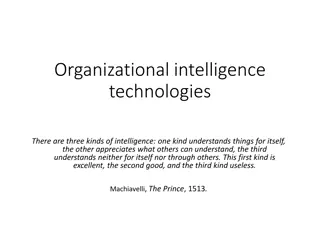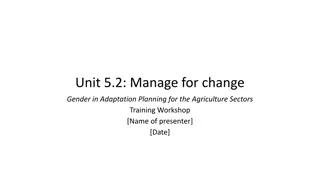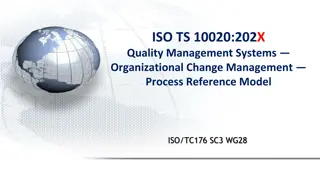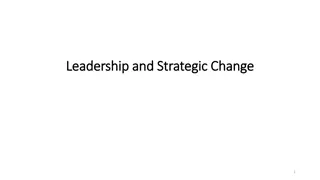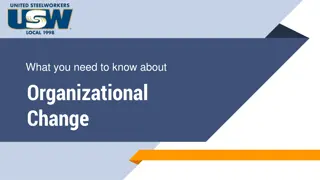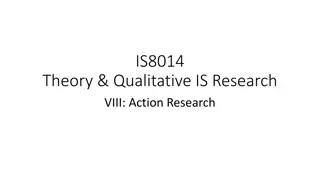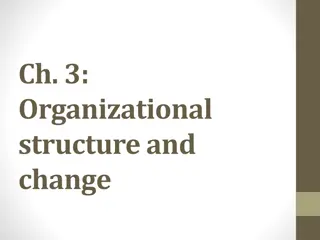Three Disciplines for Organizational Change
Organizational transformation focuses on culture change through leadership restructuring, providing opportunities for advancement, and empowering staff. System transformation involves evaluating and improving offensive, defensive, and kick game strategies. Developmental transformation enhances staff and player performance through teaching and learning methodologies. Each discipline outlines strategies for positive change and the implementation process through virtual meetings and interactive clinics.
Download Presentation

Please find below an Image/Link to download the presentation.
The content on the website is provided AS IS for your information and personal use only. It may not be sold, licensed, or shared on other websites without obtaining consent from the author.If you encounter any issues during the download, it is possible that the publisher has removed the file from their server.
You are allowed to download the files provided on this website for personal or commercial use, subject to the condition that they are used lawfully. All files are the property of their respective owners.
The content on the website is provided AS IS for your information and personal use only. It may not be sold, licensed, or shared on other websites without obtaining consent from the author.
E N D
Presentation Transcript
Mickie Swisher Family, Youth & Community Sciences mesw@ufl.edu 352-273-3538
Understand the strengths and weaknesses of your team member style Understand the four phases of the team-work cycle Know the eight roles that team members can play and be able to identify them in practice Know your personal phase and role preferences Be able to use the strengths and weaknesses of your team member style to enhance team performance
Oh please not one more excuse from Jamie about why she couldn t get her job done. Bill is such a downer! I can t stand listening to Holly ramble on one more minute! I m so frustrated I could pull my hair out! My pet peeves
To assume a new identity as a member of the team to think of ourselves as a member of the team and act like one To work with and trust other team members who may be people that we would not choose as friends at all To spend our time and effort on achieving a goal or completing a task for which the team not the individual will get credit act like one
How you act as a team member is strongly related to your overall personality style But your personality style expresses itself quite differently in different settings You don t act the same at a football game and in a team meeting even though your underlying personality is stable It expresses itself differently
Assertiveness Expressiveness Expressive (Displays emotions) Assertive (Tells) Task oriented Active Confident Ambitious Versatile Sociable Extroverted Unassertive (Asks) Reserved (Controls emotions) Reserved Easy going Private Deliberate Dogmatic Controlled Quiet
List 1 Thorough Impressive Analytical Self Reliant Task Oriented Trusting Understanding List 2 Strong Willed Talkative Motivating Generous Popular Action Oriented Adventurous
List 3 Animated Powerful Even Tempered Enthusiastic Results Oriented Supportive Orderly List 4 Patient Cooperative Outgoing Precise Hard Driving Technical Challenging
List 5 Diplomatic Charismatic Candid Accommodating Sentimental Stimulating Spontaneous List 6 Lively Diligent Detail Oriented Authoritative Meticulous Appreciative Accurate
List 7 Consistent Dramatic Optimistic Agreeable Competitive Logical
Action Oriented Adventurous Authoritative Candid Challenging Competitive Hard Driving Impressive Powerful Results Oriented Self Reliant Strong Willed Direct
Animated Charismatic Dramatic Enthusiastic Lively Motivating Optimistic Outgoing Popular Spontaneous Stimulating Talkative Spirited
Accommodating Agreeable Appreciative Cooperative Diplomatic Even Tempered Generous Patient Sentimental Supportive Trusting Understanding Considerate
Accurate Analytical Consistent Detail Oriented Diligent Logical Meticulous Orderly Precise Task Oriented Technical Thorough Systematic
Team Member Styles Assertive, forward thinking DIRECT Energetic, creative SPIRITED Thoughtful, supportive CONSIDERATE Consistent, well-organized SYSTEMATIC 16
Focuses on the big picture Believes that conflict can be constructive Takes risks Communicates assertively Loves generating new ideas Open to change Recognizes and praises the accomplishments of others Has lots of energy & enthusiasm . Strengths Trouble Spots
Generates excitement Is spontaneous Has good persuasive skills May exaggerate May become over- dramatic Strengths Trouble Spots
Listens actively Considers others feelings Is patient May avoid conflict May give in easily Strengths Trouble Spots
Makes decisions based on facts Is analytical Stays calm and rational May become bogged down in details May be impersonal Strengths Trouble Spots
1. INITIATION 1. INITIATION 7
The first phase of the Team is defined. The first phase of the Team- -Work Cycle occurs when the task is defined. Work Cycle occurs when the task The task may be a need to be satisfied, a question to be answered, an issue to be resolved, a decision to be reached, a goal to be met, a problem to be solved, a project to be completed, or any of several other types of work. The task may be a need to be satisfied, a question to be answered, an issue to be resolved, a decision to be reached, a goal to be met, a problem to be solved, a project to be completed, or any of several other types of work. In this stage it is important to specify as concretely as possible what the task is and the results desired when the task is completed. In this stage it is important to specify as concretely as possible what the task is and the results desired when the task is completed. Failure in this phase may result in aimless floundering, wasted efforts, and/or dissolution of the work team in later stages. Failure in this phase may result in aimless floundering, wasted efforts, and/or dissolution of the work team in later stages.
1. INITIATION 1. INITIATION 2. IDEATION 2. IDEATION 9
In this phase, alternative ways to approach the task are generated. In this phase, alternative ways to approach the task are generated. These options may be potential need satisfiers, answers to questions, possible problem solutions, ways to reach a goal, means of making decisions, designs for completing a project, or several other types of approaches to a task. These options may be potential need satisfiers, answers to questions, possible problem solutions, ways to reach a goal, means of making decisions, designs for completing a project, or several other types of approaches to a task. It is important to produce a number of ideas about how to do the defined task. Originality, applicability to the work to be performed, and variety are important. It is important to produce a number of ideas about how to do the defined task. Originality, applicability to the work to be performed, and variety are important. Failure in this phase may result in habitual, limited approaches to a task. Such rigidity can lead to efforts, loss of effectiveness, and low team morale. Failure in this phase may result in habitual, limited approaches to a task. Such rigidity can lead to mis efforts, loss of effectiveness, and low team morale. mis- -directed directed
1. INITIATION 1. INITIATION 3. 3. 2. IDEATION 2. IDEATION ELABORATION ELABORATION 11
The third phase involves the elaboration of alternative ways to accomplish the task. The third phase involves the elaboration of alternative ways to accomplish the task. The essential job in Elaboration is to try to make ideas work terms. Answers to reality needed. The essential job in Elaboration is to try to make ideas work to flesh out the skeletons of various alternatives, in real terms. Answers to reality- -oriented, hard questions are needed. to flesh out the skeletons of various alternatives, in real oriented, hard questions are It is important to examine possible conflicts among people in making these plans, as well as defining the best ways to utilize human resources. Similarly, conflicts between time schedules, budgets, equipment, and other physical resources must be thought through. Failure to complete this phase adequately may result in conflicts that could jeopardize the task and the team s continued survival. It is important to examine possible conflicts among people in making these plans, as well as defining the best ways to utilize human resources. Similarly, conflicts between time schedules, budgets, equipment, and other physical resources must be thought through. Failure to complete this phase adequately may result in conflicts that could jeopardize the task and the team s continued survival.
4. 4. 1. INITIATION 1. INITIATION COMPLETION COMPLETION 3. 3. 2. IDEATION 2. IDEATION ELABORATION ELABORATION
The last phase occurs when the alternative approaches are considered and evaluated, one is chosen, and work is performed. The last phase occurs when the alternative approaches are considered and evaluated, one is chosen, and work is performed. This phase requires perceptive analysis of real situations, use of appropriate criteria to evaluate options and to measure results, and the ability to carry out plans in the real world. Similarly, perseverance in doing detailed work is required. This is where ideas and plans are put to the test. This phase requires perceptive analysis of real situations, use of appropriate criteria to evaluate options and to measure results, and the ability to carry out plans in the real world. Similarly, perseverance in doing detailed work is required. This is where ideas and plans are put to the test. It is important to weigh costs and benefits, to compute the bottom line, and to calculate the odds for success and failure of the task. It is important to weigh costs and benefits, to compute the bottom line, and to calculate the odds for success and failure of the task. Failure to complete this phase adequately may result in errors, wasted energy, possible failure of the task, and dissatisfaction of team members. Failure to complete this phase adequately may result in errors, wasted energy, possible failure of the task, and dissatisfaction of team members.
Think about any team of which you are a member right now. Write down: Three things you like most doing as a team member Three things you like least doing as a team member
Leader wants to get it done! Manager wants to get people to work together Leader - Manager Moderator - Organizer Moderator wants everyone s input Organizer wants to structure the process Creator - Evaluator Creator wants to get lots of ideas on the table Evaluator wants to prioritize, pare it down Innovator Finisher Innovator wants to take advantage of every opportunity Finisher wants to complete one task before starting another
TEAM TEAM TEAM- -WORK & TEAM- -ROLES MODEL WORK & ROLES MODEL 4. COMPLETION COMPLETION 1. INITIATION INITIATION Finisher Finisher Leader Leader Evaluator Evaluator Moderator Moderator Creator Creator Organizer Organizer Manager Manager Innovator Innovator 3. ELABORATION ELABORATION 2. IDEATION IDEATION 92
